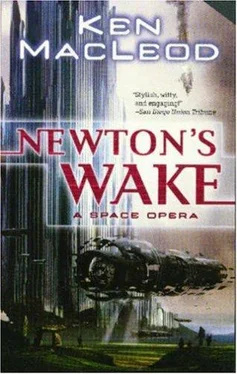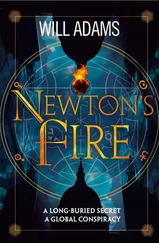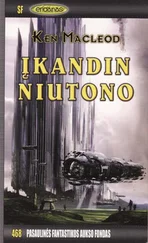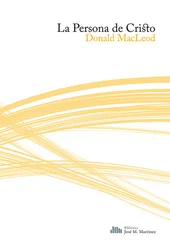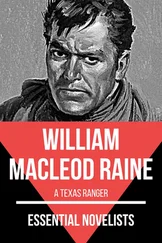‘I understand the irony of the situation,’ said Ben-Ami. ‘I’ll thank you to understand its seriousness.’
Winter rocked forward and put his elbows on the table. ‘All right,’ he said. ‘Yeah, I can understand the seriousness, sure. War machines, Zen mechanists, and Glasgow gangsters.’ He fought an involuntary smirk. ‘And going FTL without knowing it can ruin your whole morning. What I can’t understand is how you lot crossed ten thousand light-years and happened to pick a planet that had war machines, out of all—’ He waved a hand skyward.
‘Ah,’ said Andrea. ‘It is not a coincidence. The planet was chosen by the ship. On the basis of its size, its atmosphere and water signatures, it must have looked eminently suitable for colonization.’
‘How does that make it less of a coincidence?’
Al-Khayed shrugged. ‘That a habitable planet turned out to have been inhabited? It lessens the odds, I suppose. It also increases the odds that developing out-of-control war machines is something that all civilizations do.’
‘Christ,’ said Calder. ‘That’s depressing.’ He shifted, easing his bad leg a bit.
‘But we still have Earth,’ said Winter. He glared at the strange beautiful people. He didn’t want to join in their projects without putting down a marker. ‘I still want that, you know. I want it back.’ He sighed. ‘I want us to get them all back.’
Ben-Ami and Al-Khayed looked at him with sympathy but without comprehension. The two Eurydiceans didn’t seem to recognise the phrase at all, or to have the faintest idea what he meant. It was, Winter thought, just as well.
‘I could use a cigarette,’ said Calder.
H
e stubbed it out before they got in the lift.
‘I’d been hoping for dropshafts,’ said Winter, as the doors closed. It might have been an Otis lift.
Andrea Al-Khayed got it.
‘At least we have aircars,’ she said. ‘And entopters.’
‘Entopters?’
‘The buzzing aircraft.’
‘Oh, right.’ The lift dropped fast. ‘Like insects.’
‘They were something of a jeu d’espirit , initially,’ said Ben-Ami. ‘They have turned out to be quite practical. The city’s upper structures are complex.’ He mimed dodging and weaving with his hand.
The doors opened and they walked out through a marble and iron-work lobby to the street. The cars moved not in lanes but in a skein of optimised trajectories, like people in crowds. Winter put this down to computer control. No surprise. There was something different about the people. Winter stood on the pavement and tried to understand what it was. The people around him were strolling rather than hurrying, and they were all richly clothed in bright silks, but it wasn’t that, and it wasn’t his odd attire that drew their attention. Whenever anyone passed they seemed to clock him, in a searching glance without a smile or nod. He saw Ben-Ami notice his frown. Calder was beginning to glare around as if he expected an attack or suspected a trick. The traffic all stopped at once and the four people threaded their way through and headed into the park.
‘There is one thing,’ said Ben-Ami, striding along. He looked uncomfortable. ‘You know that your bodies are not quite the same as the bodies you last died in.’ He waved a hand. ‘Some subtle adjustments to the native biochemistry, some immunities and so forth. It is not that. We, ah, took one liberty with your brains.’
Oh. Here it comes.
‘Without it you would be as dead socially as you would be physically without the biochemical adaptations. We maintain, as you did in your time, the cultural squick about internal interfaces with networked machinery, and about data capture, for obvious reasons. At the same time we depend, very much, on individual recognition and repute. So we have enhanced one well-mapped part of the brain—the facial recognition system. You will never again forget a face you have seen, or forget the name that goes with it, once you have heard it.’
‘Slow down,’ said Calder, hirpling to keep up. They slowed. ‘That’ll be good. Christ, the embarrassments I had back in Polarity. They were all so pretty it was hard to tell them apart. That was what was bugging me, back there. Everybody looked unique.’
‘Everybody is,’ said Andrea. She walked between Winter and Calder with unhurried quickness, boot-heels thudding, black hem snapping about her ankles. Her lab-coat had been replaced by a dun matt satin bolero.
Winter smiled sideways at her, taking a moment to refresh his appreciation of the minute particulars of her face. People had been beautiful since his first resurrection, back in the Solar system. It was a side-effect. They weren’t genetically engineered for beauty but for health. Beauty was only bone-deep. The health was permanent, the wired-in repair strategies that kept them physically young, though with experience you learned to notice the subtler effects of age in the carriage and expression; not, as in his original day, a deterioration, but a sort of honing. The openness, that almost childlike readability of the gaze he had noticed in Ben-Ami and Al-Khayed, was something new.
‘Oh, Christ,’ said Calder, halting suddenly.
‘I wanted you to see this,’ said Ben-Ami.
The first thing Winter noticed was his own name, and Calder’s, on the plinth in front of them. Then he looked up, at the statue’s mutually clutching nude bodies, balanced on one foot of the taller, whose face was his own. He moved around, and saw the look on the representation of Calder’s, then turned back and saw the same look on the real man’s face. Calder could have been about to scream.
Winter laughed.
‘The statue is popularly known as “The Lovers,” ’ said Ben-Ami.
At that Calder laughed too.
‘I had noticed that you found this reference amusing,’ said Al-Khayed.
‘Do you know what that shows?’ said Winter. ‘It’s us falling into a peat bog . The one our bodies were recovered from. We were in a car. The reason my leg is stretched out like that is that I had my foot on the fucking brake !’
‘And the reason I’m holding on to him,’ said Calder, aggrieved, ‘is that I had nothing else to grab.’
‘You remember all this?’ asked Ben-Ami.
Winter looked at Calder, seeing his own bleak gaze reflected back. Calder was shaking his head almost imperceptibly.
‘It’s what happened,’ Winter said. Memory was not a subject he wished to discuss.
‘How did you come to be recovered?’ Al-Khayed asked.
‘Black Sickle scooped us off the Rannoch battlefield,’ said Winter. ‘Thought we were combat casualties. Course, the peat bog was permafrost by that time. Nuclear winter and all that.’
‘This is wonderful,’ said Ben-Ami, taking notes.
CHAPTER 6
Big in the Asteroid Belt
‘Perfect,’ said Hoffman.
Not for the first time, Carlyle suspected him of having a practical joke at her expense. Full-length, off-white cotton raschel lace over ivory polyester, frills at the collar and cuffs and a deep flounce around the hem.
‘Looks like a bloody wedding dress.’
‘It is not a bridal,’ he said. ‘Nor a bridesmaid’s,’ he added, forestalling her next objection. ‘It’s period, and ironic, and—’
‘Very this evening ,’ she singsonged. ‘All right, I’ll take your word for it. Coming?’
Headshake, extended to a shudder. ‘Folkies? Spare me. I’m sure you’ll have a wonderful time. Men will be falling over you.’
‘I’ll be the one falling over. Tripping on this.’
She tugged up a fistful of skirt to clear a way for her high-booted, high-heeled step, slung a leather satchel—the appurtenance of the evening, she’d been assured—on her shoulder, crammed on a floppy beribboned straw hat and made her way out.
Читать дальше
